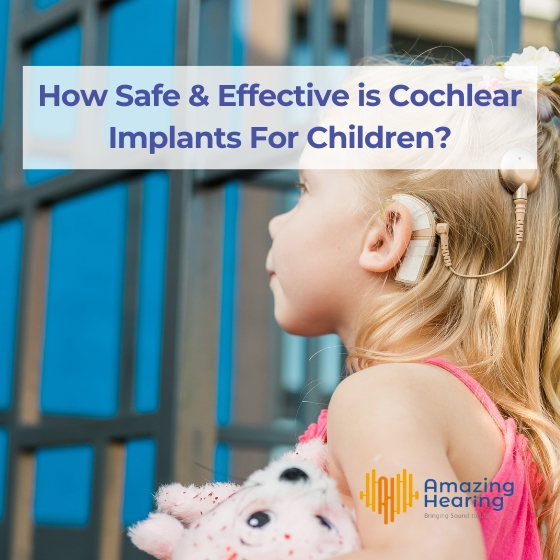Cochlear implants are electronic devices that help individuals with hearing loss to hear by directly stimulating the auditory nerve. It is a life-changing solution for people who are deaf or severely hard-of-hearing, especially children.
Some parents might have concerns about the safety and effectiveness of cochlear implants for their child. This article will provide an overview of how safe and effective these devices are for children.
Understanding Cochlear Implants
A cochlear implant consists of two main components – an external part and an internal part. The external part includes a microphone, speech processor, and transmitter that are worn behind the ear or on the body. The internal part is surgically placed under the skin behind the ear and includes a receiver and electrodes that are inserted into the cochlea.
The microphone picks up sounds from the environment, which are then processed by the speech processor. The processed signals are sent to the transmitter, which transmits them to the receiver under the skin. The receiver then sends these signals through electrodes in the cochlea, stimulating the auditory nerve.
Benefits of Cochlear Implants
Cochlear implants have revolutionised the way we treat severe hearing loss and deafness. They offer many benefits to individuals who are unable to hear or understand speech with traditional hearing aids. Some of the major benefits include:
a) Improved Speech Recognition
Cochlear implants are designed to bypass damaged parts of the inner ear and directly stimulate the auditory nerve.
This allows individuals with severe hearing loss to better understand speech and sounds, even in noisy environments.
b) Increased Sound Awareness and Perception
Unlike traditional hearing aids, which amplify sounds, cochlear implants convert sounds into electrical signals that directly stimulate the auditory nerve.
This means that individuals with cochlear implants can perceive a wider range of sounds compared to those using traditional hearing aids.
c) Enhanced Communication Abilities
Improved speech recognition and sound perception allow individuals with cochlear implants to communicate more effectively in different settings. This significantly impacts their personal and professional lives, enabling them to engage in conversations and understand information without relying on lip reading or written communication.
Cochlear implants improve speech understanding in noisy environments, helping individuals socialise and engage in groups. This is especially beneficial for children, enabling them to participate in class and achieve better academic success.
d) Improved Quality of Life
Cochlear implants have significantly improved life for those with severe hearing loss. They enable better communication, full participation in daily activities, and greater enjoyment of sounds. Studies show that users report higher satisfaction and well-being compared to those using hearing aids or no devices.
Cochlear implant technology also keeps improving, with smaller, more discreet devices, longer battery life, and better sound quality. This makes it easier for individuals to use them daily, without feeling self-conscious or limited.
Why The Worry?
Despite the numerous benefits and advancements of cochlear implants, there are still some concerns and misconceptions surrounding this technology. Some individuals may worry about the safety of having an electronic device implanted in their bodies, or the potential side effects.
However, studies have shown that cochlear implants are safe and do not pose any significant risks to one’s health. The surgery itself is relatively simple and carries a low risk of complications.
Another common concern is the potential loss of residual hearing in the implanted ear. While it is true that some individuals may lose their remaining hearing after receiving a cochlear implant, this can be managed by adjusting the implant settings or using a combination of a hearing aid with the implant.
Is It Safe For Children?
Cochlear implants are safe for children, with eligibility starting at 12 months old with proper medical clearance. Research shows early intervention significantly improves a child’s ability to develop speech and language skills comparable to their hearing peers.
There are additional considerations when it comes to children receiving cochlear implants, such as potential impact on learning and development, but these concerns are typically addressed by working closely with a team of professionals, including audiologists, speech therapists, and educators.
Takeaway
Cochlear implants are a highly effective and life-changing solution for individuals with severe hearing loss or deafness. They work by bypassing the damaged parts of the ear to directly stimulate the auditory nerve, allowing individuals to perceive sound.
While they may not completely restore normal hearing, cochlear implants can greatly improve communication abilities and overall quality of life. If you or a loved one is experiencing severe hearing loss, it’s important to consult with an otolaryngologist (ear, nose, and throat specialist) to determine if a cochlear implant may be the right option.
Contact Amazing Hearing
If you are considering a cochlear implant or want to learn more about the procedure, contact Amazing Hearing today. Our team of experienced audiologists and specialists can provide comprehensive evaluations, counselling, and guidance to help determine if a cochlear implant is the right choice for you.
In addition to cochlear implants, we offer a wide range of other hearing solutions including hearing aids, assistive listening devices, and auditory training programs. We are committed to providing personalised care and support for our patients with hearing loss, helping them improve their quality of life and communication abilities.


